#economic justice
Text
Justice 40
Joe Biden is boring and often bad at tooting his own horn, but by god, he is good at process.
Justice 40 is simple but powerful application of that. its a shift in how the executive branch works. 40% of money from a bunch of existing programs should go to census tracts that are overburdened with pollution, at higher risk for climate change, and have been historically underserved.
The shorthand here is basically "communities that don't have enough internal resources to deal with long term problems". So yes, communities that had been redlined for decades, ones that have Superfund sites, ones that have high rates of asthma from air pollution.
and this is by census tract. Not city. census tract. So parts of New York City qualify... but other parts don't. And the city HAS to use the money in the targeted part. it doesn't go into the communal pool. it's for THAT tract specifically.
Also all land federally recognized as belonging to a Native American tribe and all Alaskan Native Villages qualify, specifically.
And again, this is for existing programs that are already running and have existing staff and budgets. They're supposed to prioritize grants and projects for those areas specifically. And that's everything from Department of Agriculture, to FEMA, to Labor, to Environmental Protection.
Does it instantly get rid of all the baked in racism from decades past? No, not even close. But it puts in a countermeasure that has a concrete and measurable goal to aim for rather than a nebulous "suck less." even if the administration changes, many of those changes will stick.
And as things improve, some tracts may come off the list! Some may go on that weren't there before!
You can see a map here. Blue highlighted tracts are "disadvantaged" so qualify for that extra assistance! Check and see if you live in one or part of your town does. Because if you've been hearing constantly "we can't afford to fix X problem..." and you're in that tract.... there's money available. For you. Build that sidewalk, fix those lead pipes, get that brush truck your volunteer fire department has been asking for.
And tell your local officials that! "did you look at Justice 40 for funding". And even if they're doing their best, particularly people in little towns.... being a government official isn't their full time job. They may have missed it. Just asking them about the program may suddenly open a world of possibilities.
9K notes
·
View notes
Text
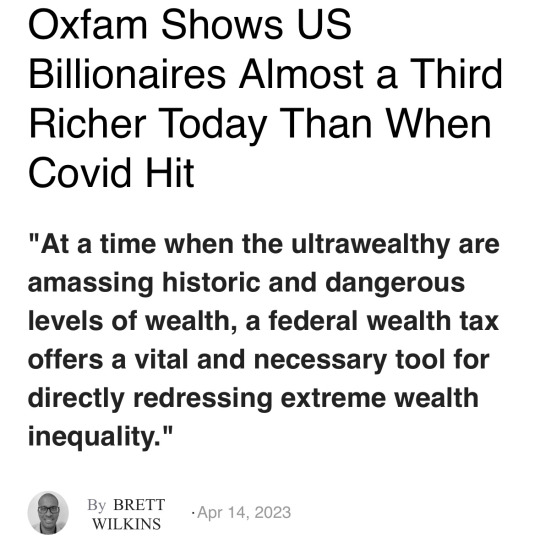
Source
Eat the rich
#income inequality#wealth inequality#billionaires should not exist#eat the rich#tax the rich#socioeconomic inequality#economic justice
3K notes
·
View notes
Text
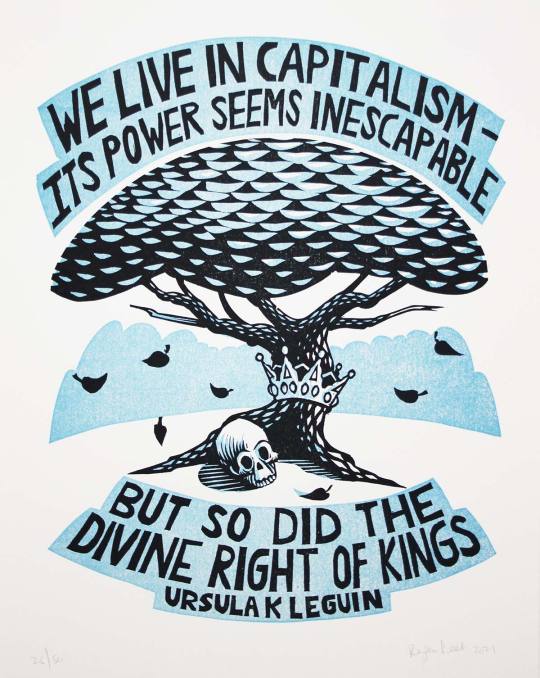
Artist credit:
#ursula k. le guin#hopepunk#hope punk#solar punk#solarpunk#futurism#climate and environment#climate action#climate hope#climate chaos#clean energy#capitalist society#capitalism#capitalist dystopia#resistance#faith in the future#economic justice#workers rights#imagine better
2K notes
·
View notes
Photo
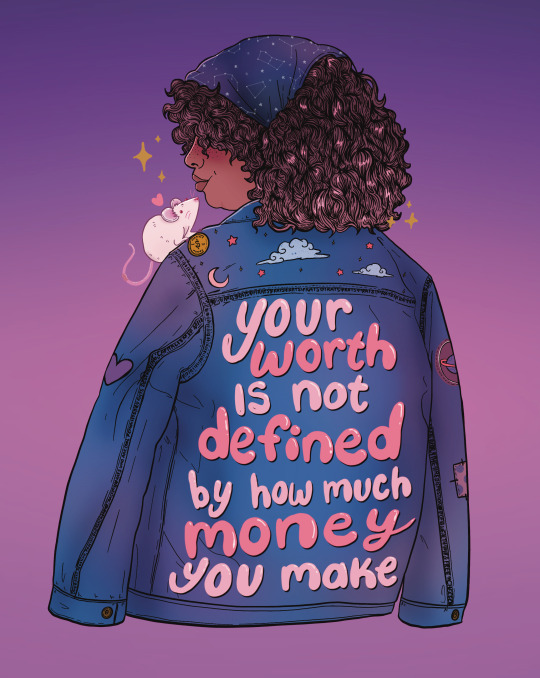
We should all be able to thrive & earn livable wages. Your worth is not, and should not be, defined by how much money you make.
Digital illustration of a the back of a Black fem wearing a blue jean jacket. On her shoulder is a white rat holding a coin. There's text that reads, 'your worth is not defined by how much money you make.
#art#feminism#feminist#jean jacket#rat#animal#feminist art#income inequality#economic justice#graPHIC
2K notes
·
View notes
Text

8 notes
·
View notes
Text
Why we need Land Back
We should talk about current issues Indigenous people face.
In Canada at least there are many problems still happening.
Indigenous children are being ripped away from their loving families and put into foster care simply because the families are poor or the parents struggle with mental illness or something like that.
Women are being forcibly sterilized against their will.
Girls, women, and 2 spirit people are being kidnapped and sold into sex slavery and are also getting murdered and raped and their bodies are being thrown into the landfills.
The land that Indigenous communities need for their cultures and livelihoods is being destroyed by resource extraction companies that cut through the landscape and leave open wounds, that pollute the land, air, and water, and destroy the biodiversity and health of the ecosystems.
There is police brutality against Indigenous people, and people are killed by the police every day. There are hate crimes against Indigenous people.
Social services on reserves, including education, healthcare, utilities, housing, etc, are horrifically underfunded, and are funded much less well than the same social services off of reserves.
There’s discrimination in employment, in healthcare, in pretty much everything. And Indigenous people are kept in poverty and homelessness by the discriminatory society.
We need Land Back.
Land Back will allow Indigenous people to stop their land from being destroyed. Their cultures and livelihoods and mental health and spiritual health and well-being is so deeply tied to the land/nature. And actually, having them be able to effectively protect the land helps all of us because all humans are dependant upon the land even if we don’t realize it.
It will also allow Indigenous communities to force the government to stop discriminating against them by giving them worse social services. It will allow them to force the government to give them the same social services everyone else gets.
It will also allow them to force the government to stop taking their children. All children deserve to be with the families who love them and they should not be ripped away from their families, because this causes deep and devastating lifelong trauma.
It would allow Indigenous communities to stop rapists and traffickers and murderers from entering their communities. It will allow them to force rapists and traffickers and murderers out of their communities. And it will allow them to make sure every case of people getting raped or kidnapped or trafficked or killed is properly investigated and the victims are saved and the perpetrators get justice. Same with other hate crimes.
It will allow Indigenous people to have the power necessary to push back on police brutality and build better models of law enforcement, including community-ventured models.
Indigenous communities will also likely get a flow of money that they can use to lift their people out of poverty.
They’ll have the power to stop healthcare discrimination and forcible sterilization. And they’ll have the power to force us to give justice to unethical healthcare professionals and to force systemic change in the healthcare system so that medical mistreatment doesn’t happen.
Indigenous people would also have the opportunity to do more outreach to settler communities and teach them about Indigenous culture and values and stuff, so that people learn to be less racist and discriminatory.
Land Back will help pretty much every marginalized community because stopping racism and discrimination for one race usually leads to there being decreased racism and discrimination for other races too.
Ultimately Land Back is about giving Indigenous people and communities the power to keep themselves and each other safe in a society that is actively against them. It is also about keeping the ecosystems that we all rely upon safe, and about stopping discrimination and racism.
Giving Indigenous people power to protect themselves and their communities isn’t going to prevent any other community from protecting themselves. It will create more equality and social justice for everyone in Canada.
I support Land Back. I’m a settler girl and I support Land Back, and you should too.
#climate crisis#leftism#left#left wing#leftist#social justice#economic justice#equal rights#equality#racism#racial justice#discrimination#prejudice#racial prejudice#stop prejudice#bipoc lives matter#BIPOC lives matter#indigenous lives matter#indigenous rights#indigenous sovereignty#canadian#canada#canadian politics#cdnpoli#land back#genocide#colonization#colonialism#systemic oppression#systemic inequality
15 notes
·
View notes
Text
Ignorance seems soo nice I can see why people would opt for that. Imagine consuming unethically without a care. Imagine living however you want and still be able to sleep at night. Imagine being unfamiliar with the concept of accountability.
#anti genocide#free palestine#boycott divest sanction#jews for palestine#free congo#free drc#free sudan#labor rights#child labor#slave labor#ethically sourced#accountability#consumerism#late stage capitalism#economic justice#intersectional social justice#intersectional activism#economic reforms#wealth redistribution#environmental justice#israeli occupation#colonialism#colonial violence#boycott disney#boycott starbucks#boycott mcdonalds#grassroots activism#autistic thoughts#social responsibility#environmental responsibility
8 notes
·
View notes
Text
AN OPEN LETTER to THE U.S. SENATE
Women deserve equal pay! Pass S. 728, the Paycheck Fairness Act now!
393 so far! Help us get to 500 signers!
Women—especially women of color—are the backbone of our nation’s economy. But they are consistently underpaid and their work is undervalued. Action on equal pay is sorely needed to address these inequities, but Republican Senators have blocked vital legislation, S. 728, the Paycheck Fairness Act, that would achieve critical progress. The median annual earnings for women working full time, year-round in 2022 was $52,360, or just 84 cents for each dollar earned by men, with much wider gaps for most women of color compared with white, non-Hispanic men. All women—regardless of the number of hours worked during the year—typically made $41,320, or 78 cents for each dollar earned by all men. Discrimination is one of the factors contributing to this gap, leading to thousands of dollars in lost wages for women over the course of their careers. That’s why we need the Paycheck Fairness Act. The Paycheck Fairness Act would strengthen existing equal pay protections, prohibit retaliation against workers who discuss their pay or challenge pay discrimination, limit employers’ reliance on salary history, and much more. These robust measures would bring us one step closer to equal pay. Women and families cannot afford to wait for equal pay. We need to pass the Paycheck Fairness Act now.
▶ Created on April 3 by Jess Craven · 393 signers in the past 7 days
📱 Text SIGN PWBBDA to 50409
🤯 Liked it? Text FOLLOW JESSCRAVEN101 to 50409
#activate your activism#AN OPEN LETTER to THE U.S. SENATE#Women deserve equal pay! Pass S. 728 the Paycheck Fairness Act now!#393 so far! Help us get to 500 signers!#Women#women of color#WOC#S. 728#the Paycheck Fairness Act#84 cents to 1 dollar#wage gap#intersectional feminism 101#▶ Created on April 3 by Jess Craven#393 signers in the past 7 days#📱 Text SIGN PKEOQT to 50409#🤯 Liked it? Text FOLLOW JESSCRAVEN101 to 50409#JESSCRAVEN101#PWBBDA#resistbot#equal pay#paycheck fairness act#women's rights#gender equality#women in the workforce#pay equity#economic justice#discrimination#salary history#workplace fairness#workplace equality
6 notes
·
View notes
Text
Something for Martin Luther King Day
On Sunday 04 November 1956, Dr. Martin Luther King Jr. delivered a sermon at the Dexter Avenue Baptist Church in Montgomery, Alabama. The inspiration for this homily was an imagined Epistle which the Apostle Paul sent to Americans.
Here is an excerpt from that sermon dealing with economic justice.

Paul/MLK had criticisms of capitalism though he was no fan of communism with its consequent totalitarianism.
This sermon appears as Chapter Fourteen in the book Strength to Love.
It also appears in The Papers of Martin Luther King, Jr., Volume III: Birth of a New Age under the title "Paul's Letter to American Christians".
Dr. King would certainly have had something to say about this recent report.
World's richest five men double wealth — Oxfam
#martin luther king day#martin luther king jr.#sermon#paul's letter to american christians#capitalism#superfluous and inordinate wealth#the filthy rich#economic inequality#poverty#economic justice#democracy
7 notes
·
View notes
Text

The stark brutality of chattel slavery is absent in today's world, but the systemic inequities and hidden forms of economic control persist, albeit in different forms. By comparing the conditions of historic slaves with modern working-class people it becomes apparent that economic exploitation and wealth disparity need to be at the forefront of today's political discourse.
Continuities:
Labor exploitation: Both systems extract disproportionate value from a specific group's labor for the benefit of others. Slaves were forced to work without compensation, while many modern workers face low wages, precarious employment, and limited bargaining power, leaving them susceptible to exploitation.
Wealth disparity: Both systems exacerbate wealth inequality. Slaves had no ownership of their labor or its fruits, while the wealth generated by modern workers often concentrates at the top of the economic pyramid, creating a widening gap between rich and poor.
Limited mobility: Both systems restrict upward mobility for the exploited group. Slaves were legally bound to their owners, while modern systemic barriers like discriminatory hiring practices, inadequate education, and debt-based control can confine individuals to lower economic strata.
Psychological impact: Both systems can inflict psychological harm. Slaves endured constant dehumanization and fear of violence, while modern workers can face chronic stress, anxiety, and powerlessness due to precarious employment and economic insecurity.
Transformations:
Formal freedom: Modern workers have legal freedoms and autonomy denied to slaves. They can choose their employers, negotiate wages, and participate in civic life.
Social mobility channels: While limited, some avenues for upward mobility exist in modern society through education, skills training, and entrepreneurial ventures, which were largely unavailable to slaves.
Social safety nets: Modern societies typically have some form of social safety net, albeit often inadequate, providing limited protections like unemployment benefits or healthcare access, which were absent for slaves.
Transformation of control: Control in modern systems is often more subtle and diffuse, operating through debt, lack of ownership, and market forces rather than overt coercion.
Hidden "Economic Slavery":
The concept of "economic slavery" suggests that modern systems can still perpetuate forms of exploitation similar to historical slavery, albeit less visibly. This can manifest in:
Debt traps: Predatory lending practices and high-interest rates can trap individuals in cycles of debt, effectively controlling their labor and choices.
Wage theft: Employers who deny overtime pay, minimum wage, or other earned wages essentially steal from their workers.
Exploitative labor practices: In some industries, migrant workers or marginalized groups face unsafe working conditions, low wages, and limited legal protections, resembling forms of forced labor.
Limited ownership: Lack of access to affordable housing, land, or productive assets limits economic agency and perpetuates dependence on wage labor.
Unveiling and Addressing Systemic Inequities:
Acknowledging the continuities and transformations is crucial for addressing the enduring legacies of economic exploitation. We need to:
Strengthen workers' rights: Promote fair wages, secure employment, and protections against exploitation.
Reduce wealth inequality: Implement progressive taxation, address wage gaps, and promote wealth-building opportunities for marginalized groups.
Increase social mobility: Invest in education, training, and infrastructure to provide equal opportunity for upward mobility.
Challenge systemic biases: Address discriminatory practices in hiring, lending, and access to resources.
Support worker movements: Encourage worker organization and collective bargaining to empower workers and advocate for their rights.
By recognizing the hidden forms of economic control and tackling their root causes, we can work towards a more equitable future where everyone has the opportunity to benefit from their labor and participate fully in society.
#Economic Slavery#Debt#Work#Justice#Slavery#exploitation#Wage Slavery#Debt Trap#Wealth Gap#Worker Rights#Economic Justice#Systemic Inequality#Modern Slavery#Labor Exploitation#Close The Gap#Fair Wages#Equitable Future#Workers Unite#labor creates all wealth#society
9 notes
·
View notes
Text
Uber, Lyft, etc.; You hired us as independent contractors. As small business owners, we are setting our terms with apps that allow us to set our rates automatically. These are our negotiating tools that allow us to be safe on the road and fair to ourselves!
We have a right in our say as individual business owners as to what each of us believes are fair contract terms on each offer and what is not, just as much as you do.
Why are you blocking us from doing fair business?
It’s not all on your terms.
youtube
2 notes
·
View notes
Text
This is a pretty cool piece of US working class and gendered history.
One of the issues we will need to consider as we try to look at sustainable clothing and an end to exploitative practices in the garment history is that until relatively very recently the work of keeping a family clothed fell almost entirely on women and femme-read members of a family group and took an enormous proportion of their time. Garment work is *still* done almost entirely by women and people read as women, though the labour has shifted to IBPOC women and femme-read people working often in very exploitative and unsafe industrial settings in the global south.
I consider it a really positive step that textile arts and crafts have become popular again as hobbies in the global north and there are more men and masc-read people doing them than ever before. It’s a really good step towards the next one of more equitable and sustainable garment production - appreciating the amount of labour and skill that goes into a garment versus how much they generally cost is a huge wake-up call.
#history#modern history#early modern history#womens history#working class history#textile history#sustainability#economic justice
11 notes
·
View notes
Photo
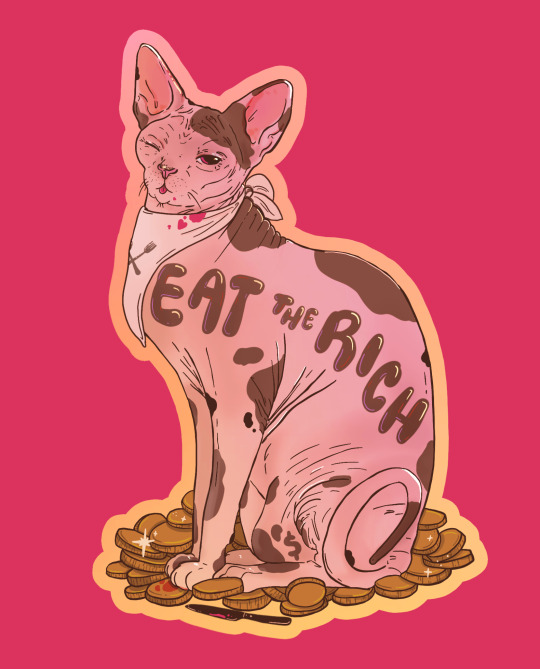
🥄 Eat the Rich! 🔪
Digital illustration of a hairless cat winking while sitting on a pile of coins. In the image is a small butter knife with ketchup and the cat is wearing a napkin. Text reads, ‘eat the rich.’
170 notes
·
View notes
Text
To Win Trans/Queer Freedom, There Are No Shortcuts
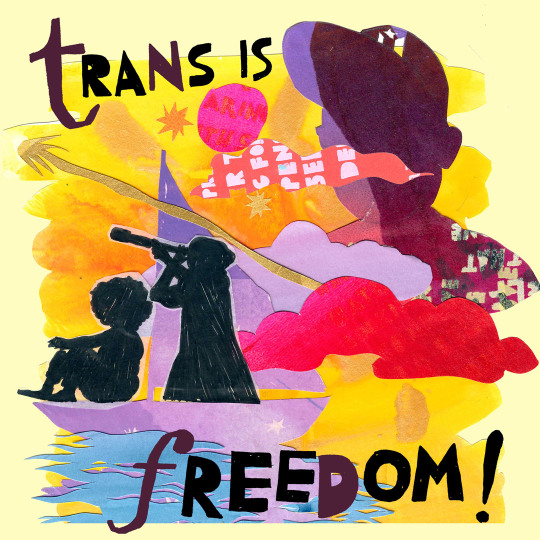
The clout chasing has already begun. After any mass tragedy, like yesterday’s shooting at Club Q, a queer nightclub in Colorado Spring, there’s a move to politicize the events from the liberal center of US-American politics. I would argue that amongst no marginalized community is this push towards liberal assimilation, and movement co-optation, worse than amongst LGBTQ people. I have already seen the tweets of liberal politicians asking for liberal LGBTQ “organizers” (campaign workers) to “drop their venmos/cash-apps/zelles/etc” so that “they can get paid in the wake of such a tragedy”. The level of unapologetic clout chasing is honestly galling. Bodies are not even in the ground and they’re already asking for people to give money to LGBTQ Democratic candidates. It’s disgusting.
Liberal assimilationist forces in the LGBTQ movement have been around for a very long time. Timothy Stewart-Winter’s Queer Clout: Chicago and the Rise of Gay Politics well documents the neoliberal turn of white gay men in Chicago towards Democratic Party politics and away from street action and mass organizing, as a means of assimilating into the liberal status quo, instead of challenging it. This turn continues to contemporarely benefit a small minority of LGBTQ people, especially (but not exclusively) gays and lesbians, while the rest of us trans and queer people are hung out to dry. Civil rights victories like same-sex marriage, which itself represented an assimilationist turn in trans and queer politics, have not ushered in a wave of continued mass organizing for expanded civil and social rights for LGBTQ people. As many trans organizers and scholars have pointed out, the “marriage equality” victory in 2015 represented the collapse of organizing infrastructure and the end of lesbian and gay politics being done on a national scale.
Liberal politicians, social media influencers, and journalists, both queer and non-queer, love to point out that trans and queer people of color were the ones who “threw the first brick at Stonewall”. Every June there are endless articles about “10 Ways to Support Trans Women of Color” and “50 LGBTQ People that Lead the Way for Equality” yet the radical politics of folks like Sylvia Rivera and Lorraine Hansberry are rarely acknowledged, and the contemporary movement implications of their work are never acknowledged. This is because the forces of assimilation in LGBTQ liberalism would be called into question if these implications were put to the forefront of public discussions of politics amongst trans and queer people.
The contemporary radical implications of our queer ancestors and foreparents are clear. It is time for that we build a radical trans and queer movement in the United States of America rooted in Black feminism, PIC abolition, trans liberation, and economic justice. Events like yesterday’s mass killing at Club Q and the Trans Day of Rememberance are not going to become less frequent while trans and queer people hold no political power in society outside of the Democratic Party establishment. We need to organize to pass the Equality Act and fight beyond it. We need to fight to free all trans and queer immigrants and asylum seekers locked in cages for seeking safety outside of their countries of origin. We need to fight to free all trans and queer people from prison. We need to fight to end the prosecution of trans women of color for acting in self-defense against violent men. We need to fight for housing for all, trans-inclusive medicare for all, free abortion on demand without apology, jobs for all, food for all, and disability benefits that are easily accessible and paid at a thriveable level. We need to fight for a globally just, decolonial, anti-militarist Green New Deal that divests from death-making institutions and invests in live-giving institutions so that trans and queer peoples of the Global Majority have the ability to stay and thrive in their places of origin without fear of US-backed coups, imperial wars, or climate catastrophe destabilizing their countries of origin, leading to violence that harms them the most.
The legacy of our trans and queer foreparents is a legacy of radical resistance to the World as it is and a radical reimagining of the World as it could be. If we continue to let liberal LGBTQ clout chasers who want to run for office, be social media influencers, or head non-profit organizations lead us down the path of assimilation, many more of us will die. If we let ultra-left anonymous twitter accounts lead us away from mass politics and towards focusing exclusively on armed self-defense and mutual aid, many more of us will die. To paraphrase Jane McAlevey, to win Trans/Queer freedom in our lifetimes, there are no shortcuts.
#trans#transgender#trans liberation#trans freedom#trans rights#queer#queer community#queer politics#lgbt#lgbtq#lgbtqia#gay pride#gay#social justice#socialism#economic justice#feminism#abolition
30 notes
·
View notes
Text
I stand with Oxfam Canada. Will you join the movement to fight inequality and patriarchy to end poverty and injustice?
https://act.oxfam.ca/page/97641/subscribe/1?locale=en-CA&en_chan=tw&ea.tracking.id=twitter&en_ref=146685240
#feminism#feminist#intersectionalfeminist#intersectional activism#poverty#economic justice#social justice#inequality#capitalism#eat the rich
4 notes
·
View notes
Text
Stone me to death if I’m wrong I guess but I really feel like any privilege comes with the responsibility to distribute that privilege downward any way you can and not hoard it exclusively for your own benefit. but idk who am I to say
#intersectional social justice#social responsibility#accountability#intersectionality#privilege#economic justice#wealth inequality#wealth redistribution#systemic violence#systemic injustice#systemic oppression#social equity#racial justice#christian privilege#male privilege#straight privilege#white privelage#grassroots activism#intersectional activism#equitability
7 notes
·
View notes